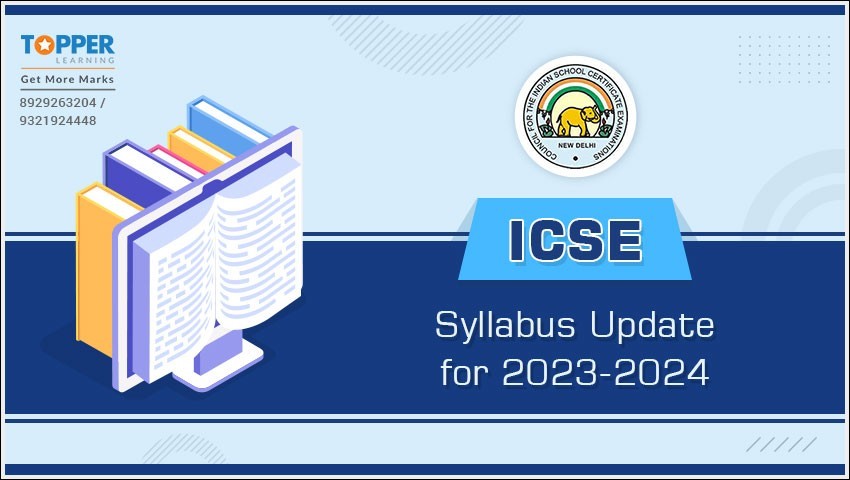ICSE Syllabus Updates for Academic Year 2023-2024

ICSE has modified its syllabus to incorporate the recommendations made by NEP 2020. Changes like reintroducing the annual board examination, reducing the syllabus, modifying the exam pattern, and permanently adding the MCQ section have been made.
By Topperlearning Expert 07th Apr, 2023 | 11:39 am
ShareThe Council for the Indian School Certificate Examination (CISCE) is one of India's main boards of education. It is responsible for conducting the ICSE examination and the ISC examination for classes 10 and 12, respectively. CISCE is known for its challenging, rigorous, and comprehensive syllabus that aims to provide a well-rounded education to students.
With the advent of the National Education Policy 2020, CISCE has made several changes in its curriculum to include project-based learning to promote critical thinking and problem-solving skills among students. Moreover, it has also introduced new subjects, like Artificial Intelligence (AI), Data Science, and Robotics, in its syllabus.
For the academic year 2023-2024, ICSE has released an updated and revised syllabus that aims to reduce the syllabus by almost 25% for core subjects. The reduction was undertaken considering the problems the normal teaching-learning process faced due to the pandemic.
Overview of the Changes Made by ICSE
Students can understand all of these changes by visiting the official CISCE website and going through the updated syllabus uploaded for 2023, 2024, and 2025 academic years.
- Annual examinations: ICSE has reintroduced the one annual board examination that will take place at the end of the academic year for classes 10 and 12. It has removed the two-term examination rule that was followed for the academic session 2021-22.
- Reduction in the syllabus: ICSE has reduced the syllabus for all core subjects by a major 25% for classes 9 to 12. The syllabus for class 10 has also been revised to include an advanced version of the topics studied in class 9.
- MCQ section added: The ISC paper has been revised to add a permanent section for MCQs. The number of MCQs has also increased significantly in the exercise questions of every chapter.
- Types of questions: Questions have been categorised as MCQs, Very Short Answers, Short Answers, and Numericals in the exercise questions, majorly for Physics and Chemistry.
- Elimination of topics: ICSE has removed various topics from several subjects in classes 9 and 10 to reduce the burden on students.
- Revised examination pattern: The exam pattern has been revised by ICSE. Students can access the revised pattern on the official website under the regulations and syllabuses section.
Overview of the Chapter/Topic Level Changes Made by ICSE
In view of the pandemic, ICSE decided to reduce the burden of chapters on students by adopting the revised and reduced syllabus in 2023-2023. However, for this year, 2023-2024, ICSE decided to restore all those chapters and topics which were deleted last year in addition to the introduction of newer topics in the syllabus.
Overall changes with respect to the deletion as well as addition of chapters and topics for ICSE 10 for this academic year 2023-2024 are listed below:
|
Subject |
Topics Deleted |
Topics Added |
|
Physics |
- |
Ch.1 Force:
Ch.3 Mechanics:
Ch.6 Spectrum
Ch. 10 Electromagnetism: Transformer- its types
Ch. 12 Radioactivity:
|
|
Chemistry |
Ch. 1: Periodic Properties and variations of Properties – Physical and Chemical
Ch. 2: Chemical Bonding
Ch. 3: Study of Acids, Bases and Salts
Ch. 6: Electrolysis
Ch. 7: Metallurgy
Ch. 8: Study of compounds
|
Ch. 3: Study of Acids, Bases and Salts
Ch. 5: Mole Concept and Stoichiometry
Ch. 6: Electrolysis
Ch. 8: Study of compounds
Ch. 9: Organic Chemistry
|
|
Biology |
- |
Ch. 5 Transpiration
Ch. 6 Photosynthesis:
Ch. 12 Endocrine system:
Ch. 14 Human Evolution (chapter added) |
|
Maths |
- |
Ch. 1 GST
|
FAQs
1. Has the ICSE syllabus changed after the pandemic?
Yes, ICSE has brought some changes in the syllabus of major subjects like English, Chemistry, Physics, and more. You can go through the latest syllabus on the official CISCE website.
2. Will there be board exams held for Class 10 ICSE?
Yes, ICSE has reintroduced the annual board examinations for class 10. The board exams for the academic year 2022-2023 have already taken place in the month of February and March 2023.
3. What is the marks distribution for ICSE board exams?
The marking scheme for all subjects can be accessed on the official website of CISCE under the regulations and syllabus section of ICSE. For Group I and II, 80% of marks have been allotted to final exams, while 20% have been assigned for internal assessment. For Group III, both final exams and internal assessments have 50% marks allotted to them.
4. What are the passing marks for board exams?
The passing mark for the ICSE board exams is 33 out of 100.
5. How to prepare for ICSE board exams?
ICSE board exams are known to be challenging. Students must start preparing months in advance to cover the entire syllabus on time. You can also take the help of TopperLearning's premium study materials like practice tests, sample and previous years' papers, revision notes, and more to boost your chances of scoring full marks in each subject.
6. How many subjects must students opt for in Class 10 ICSE board exams?
According to the latest ICSE revisions, a student needs to opt for a minimum of 6 subjects for the board exams. Group I consists of compulsory subjects. Students need to choose a minimum of 2 and a maximum of 3 subjects from Group II. From Group III, students must choose 1 subject of their preference.
More from Education
Important Resources
- Education Franchisee opportunity
- NCERT Solution
- CBSE Class 9 Mathematics
- NCERT Solutions for class 10 Science
- Sample Papers
- CBSE Class 9 Science
- NCERT Solutions for class 10 Maths
- Revision Notes
- CBSE Class 10 Hindi
- CBSE Class 10 English
- CBSE Class 10 English
- CBSE Class 10 Social Studies
- CBSE Class 10 Science
- CBSE Class 10 Mathematics
- Career In Science After 10
- Career In Commerce After 10
- Career In Humanities/Arts After 10
- NCERT Solutions for Class 10
- NCERT Solutions for Class 11
- Business Studies Class 12 CBSE project





